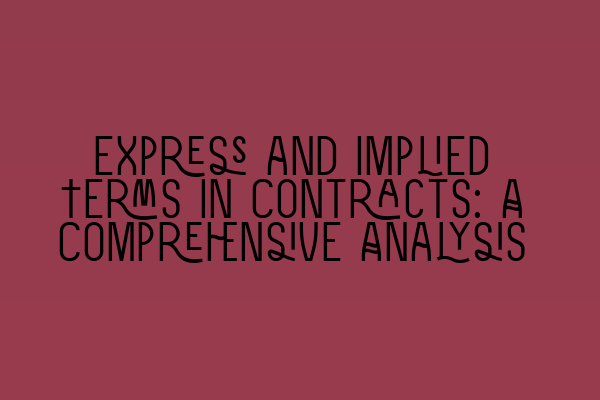Express and Implied Terms in Contracts: A Comprehensive Analysis
When entering into a contract, it is important for both parties to clearly understand their rights and obligations. This is achieved through the inclusion of terms in the contract. Terms define the rights and responsibilities of each party and help ensure that both sides are on the same page. Depending on the circumstances, these terms can be either express or implied.
Express terms are those that are explicitly stated by the parties during the negotiation and drafting of the contract. These terms can be in written or oral form, but it is always advisable to have written evidence to avoid any disputes in the future. Express terms are usually found in the main body of the contract, and their inclusion is a crucial aspect of the agreement.
On the other hand, implied terms are not explicitly stated by the parties, but rather they are implied by law, custom, or the intentions of the parties. These terms are not specifically outlined in the contract but are considered to be essential for the agreement to be effective and fair. Implied terms are often based on common law principles or specific legislation that governs the subject matter of the contract.
To fully understand the importance and implications of express and implied terms, let’s dive deeper into each of these categories:
Express Terms:
Express terms are the foundation of any contract and provide the specific details of the agreement. These terms can cover a wide range of issues, such as payment terms, delivery dates, quality standards, warranties, and dispute resolution mechanisms. It is crucial for parties to negotiate and agree upon these terms to avoid any misunderstandings or conflicts later on.
For example, a commercial contract for the sale of goods may include express terms related to the quantity, quality, and price of the goods, as well as the payment schedule and delivery terms. These terms provide clear guidance to both parties and can be enforceable in court if breached.
Implied Terms:
While express terms address specific aspects of the contract, implied terms fill in the gaps and provide additional protections for both parties. Implied terms ensure that the contract is fair, reasonable, and operates effectively. These terms can be implied by:
1. Statute Law: Certain legislation, such as consumer protection laws, employment laws, or landlord and tenant laws, can imply terms into contracts within those specific domains. These legislation-based implied terms are meant to protect the weaker party and ensure a level playing field.
2. Common Law: Implied terms can also result from court decisions, custom, or industry practices. Courts may imply terms to give effect to the presumed intentions of the parties, even if those intentions were not explicitly stated in the contract.
For instance, in a contract for the sale of goods, it is implied that the goods are of satisfactory quality and fit for their intended purpose, as required by the Sale of Goods Act 1979. This implied term protects the buyer from receiving faulty or substandard goods.
The Importance of Express and Implied Terms:
The inclusion of express and implied terms is crucial for several reasons:
1. Clarity and Certainty: Express terms provide parties with a clear understanding of their rights and obligations, avoiding confusion and potential disputes. Implied terms fill in any gaps that may exist and ensure that the contract operates fairly and reasonably.
2. Legal Enforceability: Express terms can be easily enforced in court as they are specifically agreed upon by the parties. Implied terms, whether based on legislation or common law, are also legally binding and can be enforced if they meet the necessary requirements.
3. Protection and Fairness: Implied terms provide additional protection to the parties, especially in situations where one party may have more bargaining power or expertise than the other. These terms help level the playing field and ensure fair treatment for all parties involved.
In conclusion, the inclusion of express and implied terms in contracts is vital for establishing clear rights and obligations between parties. Express terms provide specific details that parties negotiate and agree upon, while implied terms fill in the gaps and ensure fairness. Both types of terms are legally enforceable and play a significant role in the effectiveness and fairness of the contract.
If you’re preparing for the Solicitors Qualifying Exam (SQE) and want to practice exam questions or access preparation courses, check out our related articles: SQE 1 Practice Exam Questions and SQE 1 Preparation Courses. For SQE 2 preparation courses, visit SQE 2 Preparation Courses. Stay up-to-date with the latest SRA SQE exam dates by visiting SRA SQE Exam Dates.
At SQE Contract Law, we provide comprehensive guidance and resources to help you succeed in your legal career. Contact us today for expert advice and support.
